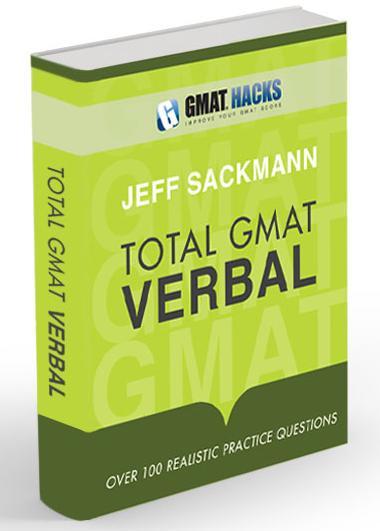
Bookshelf
|
|
Total GMAT Math Jeff's complete Quant guide, on sale now! |
|
|
Total GMAT Verbal Everything you need to ace GMAT Verbal! |
1,800 Practice Math Questions
Buy Jeff's books at Amazon.com

GMAT Official Guide, with IR
OG Math | OG Verbal
OG12 & Quant Rev solutions!
GMAT Question of the Day
Beginner's Guide to the GMAT
GMAT Hacks Affiliate Program

Recent Hacks

Categories
- General Study Tips
- Goals and Planning
- CAT Strategy
- The Mental Game
- GMAT Math Strategy
- GMAT Math Topics
- Mental Math
- Data Sufficiency
- Critical Reasoning
- Reading Comprehension
- Sentence Correction
- Analytical Writing Assessment
- Integrated Reasoning
- IR Explained
- Business School Admissions
- GMAT Prep Resources
- Practice Questions
- Total GMAT Math
- Total GMAT Verbal
- GMAT 111

Time Management for GMAT Integrated Reasoning
May 16, 2012
| You should follow me on Twitter. While you're at it, take a moment to subscribe to GMAT Hacks via RSS or Email. |
Every question type on the new Integrated Reasoning section is time-consuming. There are no "freebies" like you can become accustomed to in the GMAT Quant and Verbal sections. Thus, even if you feel comfortable with the material, proper time management is of the essence.
The new section will contain 12 questions, for which you are given 30 minutes. Making your job harder, almost all of these test items contain multiple prompts. In Multi-Source Reasoning, for example, you may have to provide separate answers for a single question.
Like I said: No cheap questions here. You'll have to work for each one.
Earlier this week, I broke down the four Integrated Reasoning question types and estimated how the 12-question section will be assembled. Based on those estimates, let's examine a time management strategy that will make sure you reach the final question in the allotted time.
As in the GMAT Verbal section, the question types are very different. For time management purposes, you'll need to treat each type individually.
- Multi-Source Reasoning: As with Reading Comprehension, the most time-consuming part of this question type is becoming familiar with the passages. Unlike RC, the questions require some additional work. Plan on two minutes to analyze the passage and 90 seconds per question.
- Table Analysis: These are big, complicated tables, and you'll need to answer three prompts for each one. Allow up to three minutes per question.
- Graphics Interpretation: The graphs on this question type don't contain as much data as the spreadsheets in Table Analysis, but they take more time to parse. Again, you'll need to handle multiple prompts per question. You'll need three minutes per question.
- Two-Part Analysis: Finally, a bit of a respite. TPA passages are similar to Critical Reasoning prompts, and may be somewhat simpler. The answer choices are often more straightforward as well. You should be able to get through these items with two minutes per question.
The good news here is that, on average, you have more time per question than you do on either the Quant or Verbal section. The bad news is, if you fall behind schedule, you don't have as much time to catch up.
Finishing each section on time is very important, so as with the other sections of the test, always consider guessing. Most test-takers will find the Integrated Reasoning section challenging, so earning a solid score of 6 or 7 will not require perfection. It is better to guess and quickly move past one or two items than it is to run out of time without reaching question 12.
Stay tuned (or subscribe) to GMAT Hacks for more tips on the brand new Integrated Reasoning section.
About the author: Jeff Sackmann has written many GMAT preparation books, including the popular Total GMAT Math, Total GMAT Verbal, and GMAT 111. He has also created explanations for problems in The Official Guide, as well as 1,800 practice GMAT math questions.
 |
Total GMAT Verbal
The comprehensive guide to the GMAT Verbal section. Recognize, dissect, and master every question type
you'll face on the test. Everything you need, all in one place, including 100+ realistic practice questions. |